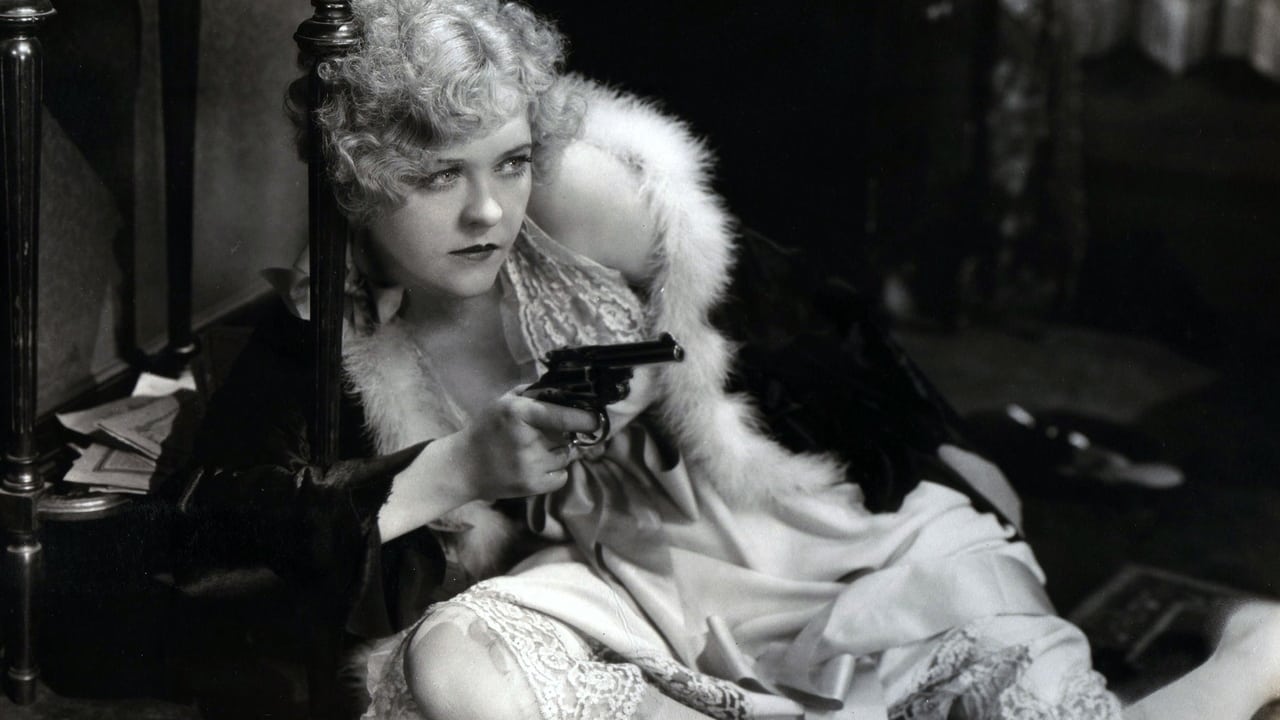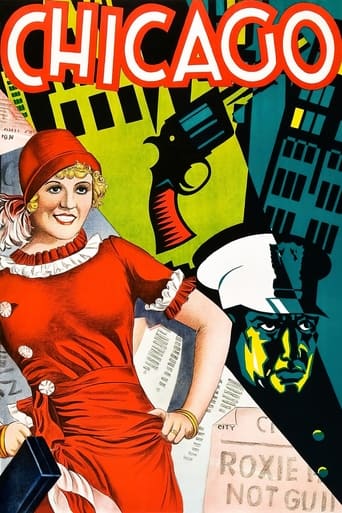Thehibikiew
Not even bad in a good way
SoftInloveRox
Horrible, fascist and poorly acted
Solidrariol
Am I Missing Something?
CrawlerChunky
In truth, there is barely enough story here to make a film.
jayraskin
I read the Maureen Watkins play after seeing "Chicago" (2002) and "Roxie Hart" (1941). I was definitely looking forward to seeing this long lost 1927 version. While, I did enjoy many things, there were also some disappointments.The good things are the little comic bits that are added which the play and other two movies do not have. These include Roxie putting black stockings on her door to pretend that someone inside has died to trick a repo-man and putting her husband's tie around her neck to show what the hangman's noose will look like. The rehearsal of her "looks" before the jury is hilarious, so are the three gum chewing young women spellbound by the trial as if watching a movie. These little bits really brighten the movie.Unfortunately, probably because conservative, religious nut Cecil B. DeMille was the producer, the sharp satire of the play and the two other movies is sharply curtailed. What we get instead is a quite melodramatic subplot which takes up almost one quarter of the film. It involves the husband and his stealing money from the lawyer Flynn and his relationship with a housekeeper. This subplot is dull and undercuts the sense of sexiness and gallows humor that the play and the other movies thrive on.While a good film and certainly worth seeing, it doesn't match the greatness of the later films or earlier play. The DVD does have some nice extras, including a well done documentary short looking at the real trial, Maureen Watkins original newspaper articles, a 1950 documentary on the 1920's and "The Flapper Story" a delightful 1985 documentary.
FerdinandVonGalitzien
Chicago in the mid 20's of the last century. In this modern Amerikan city reside the Hart's, a young married couple, who adapt to the spirit of the big city. Herr Amos Hart works in a tobacco store and Frau Roxie Hart does absolute nothing but to be unfaithful to her husband with an old man. The old-timer accommodates her whims although this is coming nearly to an end. So when Frau Roxie hears this news; she, who is a bad, bad girl ( besides a peroxide blonde with no brains ... excuse this Herr Graf for such obvious remark ) kills her lover in her apartment.Desperate over what she has done, she calls for help to her husband telling him that the old man tried to get advantage of her. Herr Hart who is a good man but not stupid at all, discovers what really happened in there. But his love for Roxie is so important to him that he decides to help her by taking the services of a famous, greedy and unscrupulous advocate ( excuse again this Herr Graf for such an obvious remark ); this in order to defend his wife from the death penalty. However, such favour has an expensive price – 5.000 grand that obviously Herr Hart doesn't have.During a visit to his greedy advocate, he finds out where he hides a lot of money in his bureau and during the night steals the money ( an honourable deed indeed, to rob an advocate ). Meanwhile Frau Roxie Hart's famous trial is nearly begun."Chicago", a film directed by Herr Frank Urson in the silent year of 1927, was based in a Broadway play which in turn was based on a true story ( occurring in a real city! ). Reminiscences of the original stage play in its primal concept can be seen in the film, when the director uses a few sets ( the Hart's apartment, the jail or the trial court ) in order to develop the story as it were different acts of a play. This is especially during the first part of the film during the dramatic development at the Hart's apartment and at the end of the movie during the trial. However, Herr Urson makes fairly good use of the proper characteristics of the cinema film narrative in "Chicago" by, constructing excellent visual metaphors ( the jury's feet responding Frau Roxie charms, the tabloid paper going down the gutter ). There are also important and sibylline sexual remarks that are present during the whole film (ah, that garter bell belt). And let's not forget the social realism that can be seen in the film ( Chicago daily life or the Hart's apartment ). Especially outstanding is the power of the yellow press in those old days ( and unfortunately in these modern days too ); the sensationalist journals build up stories on innocent celebrities that certainly have few merits. Naturally this happened with the madcap Roxie, a situation depicted in "Chicago" in a raw and effective way.Another merit of "Chicago" is the combination of comedy and drama in equal terms highlighting Frau Roxie's stupidity, selfishness and easy living in contrast with her self-sacrificing husband who suffers the acts and nonsense of his wife. He's a man who honestly cares about and loves his wife enough to steal and lie for her although this affection and emotion is not returned.Starring as the couple are two excellent and not well-known actors who handle their roles considerably well. Herr Victor Varconi as Herr Amos Hart is the lovingly and humiliated husband. Frau Phyllis Haver shines and takes all the credit in the picture thanks to her brilliant performance as Roxie Hart, a madcap, simple and selfish modern girl who has no scruples combined with no brains ... who will have a moment of glory as a famous killer thanks to the help of the yellow press ... who will meet her end on the end of a rope … a woman who lives her own life caring for no one except the money."Chicago" is an excellent silent movie for all those reasons mentioned above by this German count. Don't forget also a modern one added recently featuring a superb musical score compiled by Herr Rodney Sauer and "The Mont Alto Motion Picture Orchestra". They capture the spirit and mood of the roaring twenties of the last century.And now, if you'll allow me, I must temporarily take my leave because this German Count must to return to the Schloss from the Windy City.Herr Graf Ferdinand Von Galitzien http://ferdinandvongalitzien.blogspot.com
didi-5
I really liked this film, viewed from the UCLA print. Phyllis Haver, now all but forgotten, shines as Roxie Hart, a good time girl who despises her husband and seeks sugar daddies for fun. As soon as you see her pretending to sleep, having discarded her garter with bells attached, you know she's trouble.So Roxie kills, and goes to jail, and because she's blonde and pretty, she's taken up by the media in this wild world of flappers and jazz. Those familiar with the musical film with Renee Zellweger and Catherine Zeta-Jones will be wondering 'where's Velma?' but that character isn't in the forefront at all. This film is all about Roxie, and, more than the musical version, to some extent about her cuckolded husband Amos. Here we see his point of view on several occasions, and even follow him in scenes where Roxie doesn't appear. Victor Varconi puts in a lovely performance as Amos in this film.Haver might dominate the proceedings, and lights up what is already a fast-moving and effective bit of jazz fluff, but there's a good, if brief performance from Eugene Palette as well. As Casely he is very watchable indeed.As this was a late silent, the acting styles are mainly naturalistic, and the fact that it does not have sound, only titles, doesn't matter a bit when it comes to following the story. Miss Haver acts her heart out anyway and you can feel her contempt, her fear, her desperation, just as you would if you could hear it.A superior film, and one which occasionally makes it out for public showings. A great pity it isn't on DVD as it is extremely enjoyable and deserves a wider potential audience.
rogerskarsten
I, too, was fortunate to attend the public screening of this recently-restored film at the Academy's Samuel Goldwyn Theatre in Los Angeles. While I feel that some of the scoring choices on the part of the accompanying dance orchestra were inappropriate and distracting, and while I suspect that the projection speed was a bit slow (22 fps instead of 24), this is an excellent film adaptation (based on the original stage play) that can hold its own in comparison to the 2002 version (based on the Broadway musical). I should note, too, that this preserved print is the "roadshow" version, which means it is a longer version that was probably shown at the New York or Los Angeles premieres before being cut down for wider release in 1927.Aside from the stellar performances of Phyllis Haver (sexy, vibrant, and even affecting) and Victor Varconi (stoic and sympathetic) as Roxie and Amos Hart, what struck me most about this film was its pervasive use of dramatic irony--a device that is eminently suited to this particular story. Whereas the Bob Fosse musical seeks to emphasize the power of the media in manipulating public opinion, this 1927 CHICAGO strikes me more as a comment on the ironies of life, both cruel and merciful. To name only one example (caution: spoilers ahead), the murder scene is exquisitely conceived: as a player piano hammers out a joyful rag, Roxie rashly fires a shot as her lover walks out the door. The bullet pierces a mirror on the door and reaches its target on the other side. As Roxie looks on in horror at the dead man on the floor, the piano continues, oblivious to the tragedy that has occurred. The cracked mirror, and the black stockings on the door effectively add to the irony of the scene.This is a film that deserves a DVD release (at proper projection speed and with a top-notch score). If Phyllis Haver has been unjustly forgotten (the curse of Roxie Hart's fate), this is the film that, if marketed properly, could turn her into a bona fide 1920s icon. Talk about irony.

